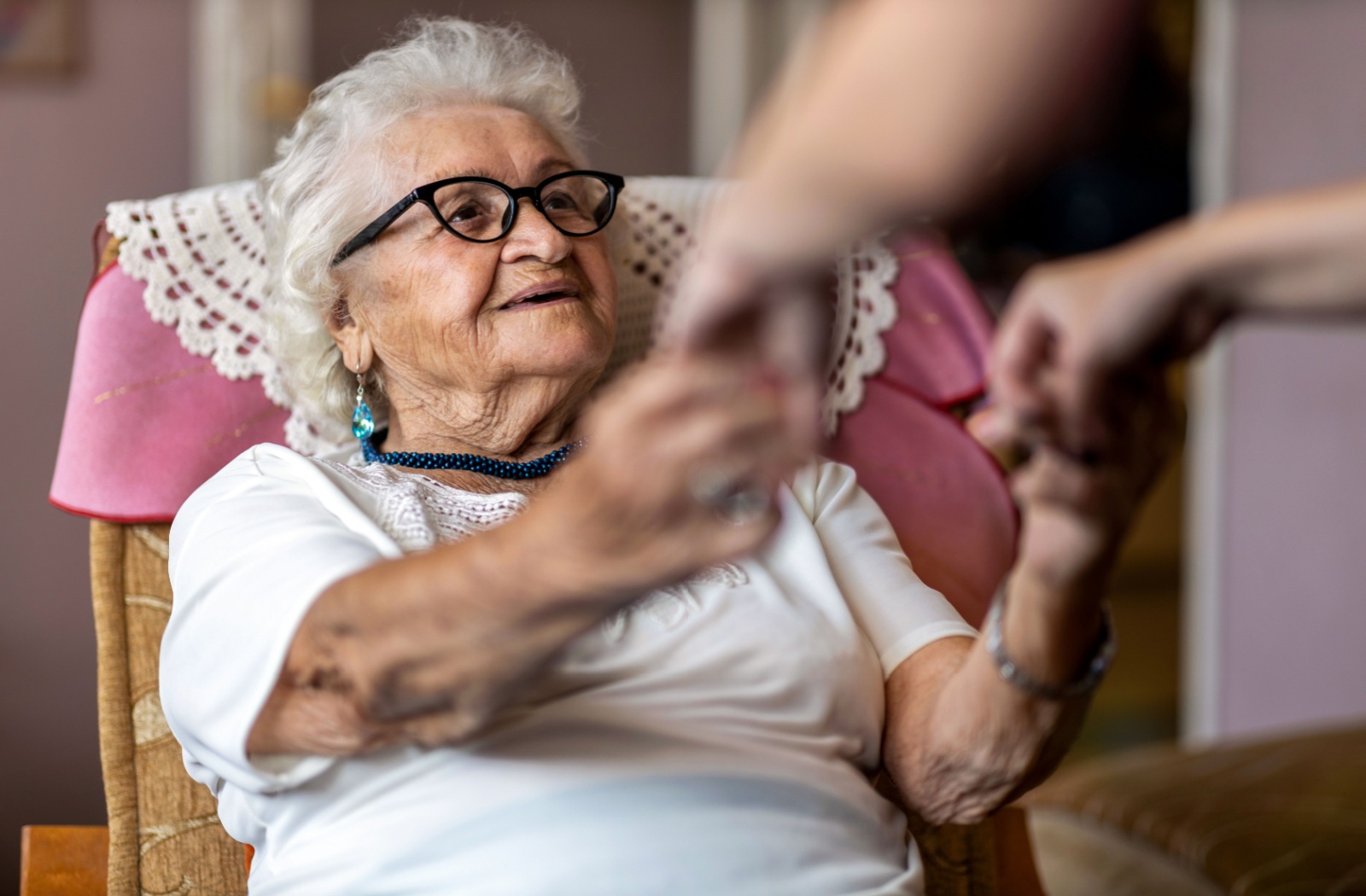Caring for a loved one with dementia at home presents both unique challenges and profound rewards. As dementia progresses, it not only affects the individual’s cognitive abilities but also impacts their emotional and physical well-being. Balancing these aspects while ensuring that your loved one feels safe and valued, especially within the familiar comfort of home, can be daunting yet deeply fulfilling.
While you can care for someone with dementia at home by creating a safe environment, establishing routines, and engaging them in activities, it’s important to recognize when professional help might be needed to make sure of both the caregiver’s and the patient’s well-being.
This is where Peregrine Senior Living steps in. We provide guidance, resources, and support for caregivers, offering personalized care plans, memory care options, and a compassionate community that focuses on enriching the lives of our residents with dementia. Our approach emphasizes individuality and purpose-driven living, making sure that both caregivers and their loved ones receive the support they need.
Understanding the Challenges
Caring for someone with dementia at home involves navigating a variety of challenges. As memory declines, older adults may experience confusion, agitation, and mood swings, requiring constant supervision and patience. Communication difficulties can also arise, making it harder to understand and fulfill their needs. Additionally, behavioral changes such as wandering or restlessness can pose safety risks.
The physical demands of caregiving—helping with daily activities like bathing, dressing, and eating—can be exhausting. Emotionally, caregivers often grapple with feelings of helplessness and frustration, particularly as the disease progresses. It’s crucial to acknowledge these challenges and prepare for them proactively.
The Benefits of Home Care
Despite these challenges, providing care at home can offer significant benefits. The familiarity of home can be comforting and help reduce anxiety. Staying in a known environment can also stimulate memory and provide a sense of stability that is often disrupted when moving to a new place.
Home care allows for personalized attention, tailored specifically to the individual’s needs and preferences. Families can maintain routines and rituals that bring joy and reassurance to their loved ones. Being surrounded by family members often fosters a sense of belonging and emotional well-being.
Practical Tips for Home Care
- Create a safe environment: Make sure the home is dementia-friendly. Remove tripping hazards, install locks on doors and windows to prevent wandering, and consider safety devices like smoke alarms and fall detectors.
- Establish routines: Regular schedules for meals, activities, and rest can provide structure and help reduce confusion and anxiety.
- Encourage engagement: Stimulate cognitive and emotional well-being through activities like puzzles, music therapy, or reminiscence therapy. Tailor activities to their interests and cognitive abilities to keep them engaged.
- Effective communication: Use simple words and sentences, maintain eye contact, and be patient. Non-verbal cues such as touch and facial expressions can also be effective in conveying care and understanding.
- Educate yourself: Understanding dementia and its progression can equip you with strategies to manage symptoms effectively. Consider attending workshops or support groups for caregivers to learn and share experiences.

Recognizing the Need for Professional Care
While home care is rewarding, it’s essential to recognize when professional help might be necessary. If your loved one’s needs surpass your capabilities, or if caregiving is severely affecting your health and well-being, it may be time to consider options such as memory care or assisted living.
Peregrine Senior Living exemplifies a compassionate approach to care, offering memory care services that focus on celebrating individuality and providing purpose-driven days. Their philosophy of pioneering care strives to change perceptions of aging and dementia, ensuring that each resident receives personalized attention in a supportive environment.
Self-Care for Caregivers
It’s important for caregivers to prioritize their own health and well-being. Caregiver burnout is a real risk, characterized by exhaustion, stress, and emotional fatigue. Regular breaks, whether through respite care services or family support, can help maintain your energy and emotional balance.
Practice self-care by maintaining your hobbies, exercising, and seeking emotional support when needed. Remember, caring for yourself is not a luxury but a necessity that empowers you to provide the best care possible.
Balancing Home Care with Professional Support for Dementia
Caring for someone with dementia at home is a journey filled with both challenges and meaningful moments. By creating a supportive environment, establishing routines, and recognizing when to seek help, you can provide compassionate and effective care.
Communities like Peregrine Senior Living offer valuable resources and alternative care options for those times when home care alone is not enough. As a caregiver, balancing your needs with those of your loved one is key to sustaining a caring, nurturing home environment.
Discover firsthand how Peregrine Senior Living is redefining the aging process with our unique focus on individuality and purpose-driven living. We invite you to explore our compassionate approach to senior care, where each resident is celebrated and supported in a nurturing environment. Contact us today to learn more or schedule a visit to experience the warmth and vibrancy of our community.













Happy Valentine’s Day! ❤️
Love takes many forms—between partners, friends, families, and even across generations.
Today we celebrate the love that fills our community: the care shared between residents and team members, the laughter that brightens our halls, and the sense of belonging that reminds us we’re never alone.
May your day be filled with connection, warmth, and heart.
peregrinecolonie.com/ ... See MoreSee Less
0 CommentsComment on Facebook
What an incredibly special day today - celebrating the love stories of our residents and their partners that have stood the test of time. Years may pass, but true love only grows stronger 💕
Lunch courtesy of Chef Vic; featuring his signature meal “Pasta a la Rustica” and “Ragout de Fruit en Feuilletage” for dessert.
Thank you to everyone who made today possible. Happy Valentines Day from all of us here at Peregrine Colonie ❤️ ... See MoreSee Less
6 CommentsComment on Facebook
... See MoreSee Less
This content isn't available right now
When this happens, it's usually because the owner only shared it with a small group of people, changed who can see it or it's been deleted.0 CommentsComment on Facebook
February is American Heart Month, a time to focus on caring for the muscle that keeps us moving and thriving. 🫀
We encourage residents to take heart-healthy steps every day: enjoying balanced meals, staying active, connecting socially, and taking moments to rest and recharge.
Together, we can make heart health a daily celebration of life and well-being.
peregrinecolonie.com/ ... See MoreSee Less
0 CommentsComment on Facebook
Want to stay connected with what’s happening across our community?
Follow us on Instagram for updates, moments we love, and stories worth sharing.
Come join the community by following us via the link below ⬇️
www.instagram.com/peregrinecolonie/ ... See MoreSee Less
0 CommentsComment on Facebook
Peregrine Baking Group with Chef Patrick! 🧑🍳
We enjoyed making rich chocolate brownie bites with fresh mint icing, but we loved eating them even more! 😋 ... See MoreSee Less
3 CommentsComment on Facebook
We had snooow much fun crafting sock snowmen! ☃️🧦❄️ No snow required 😉 ... See MoreSee Less
2 CommentsComment on Facebook